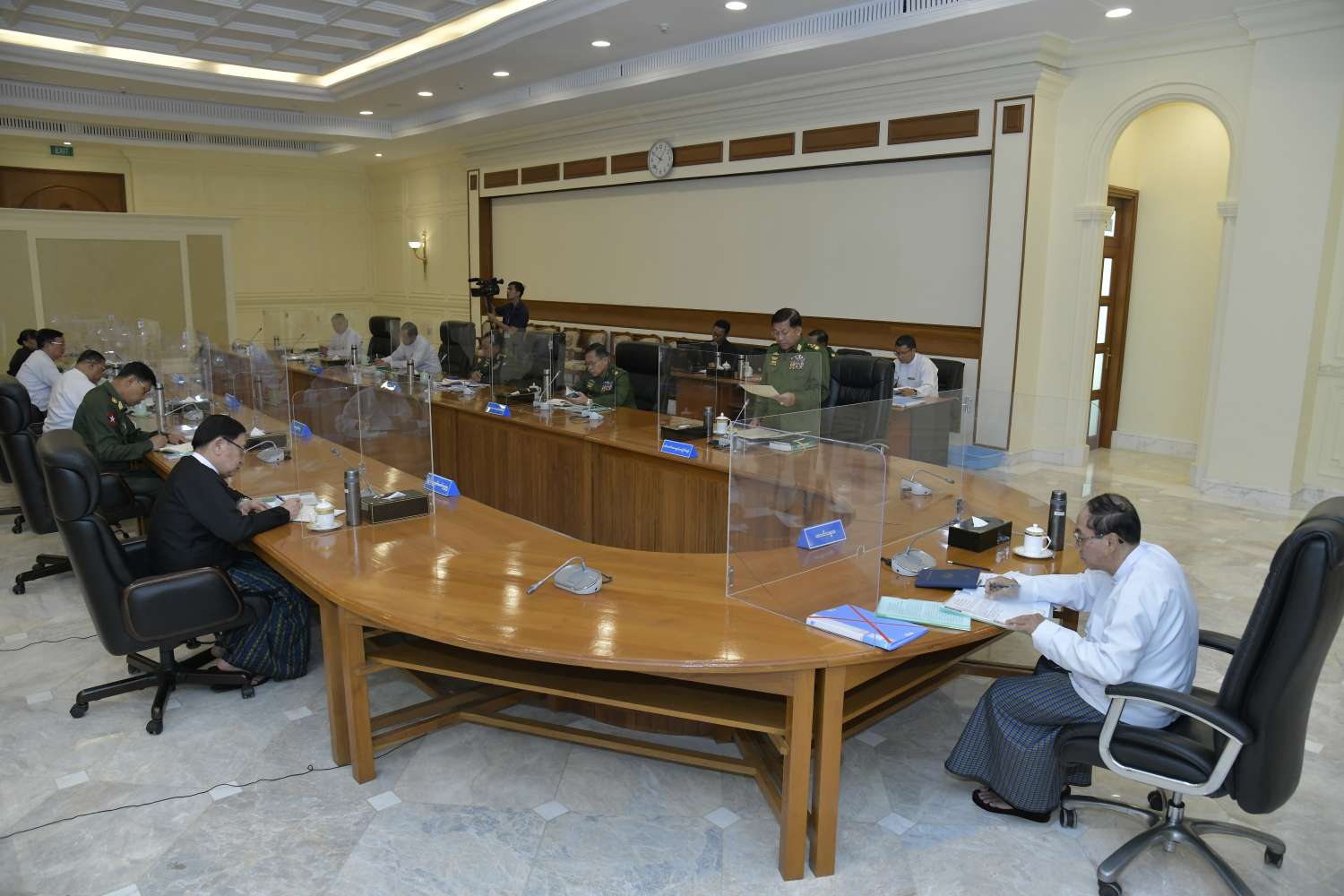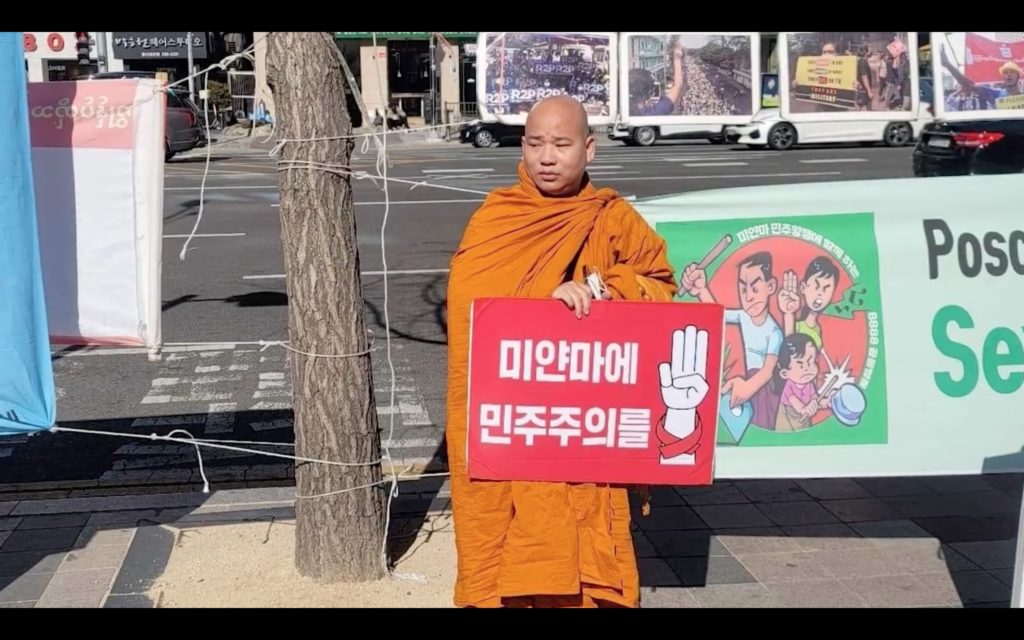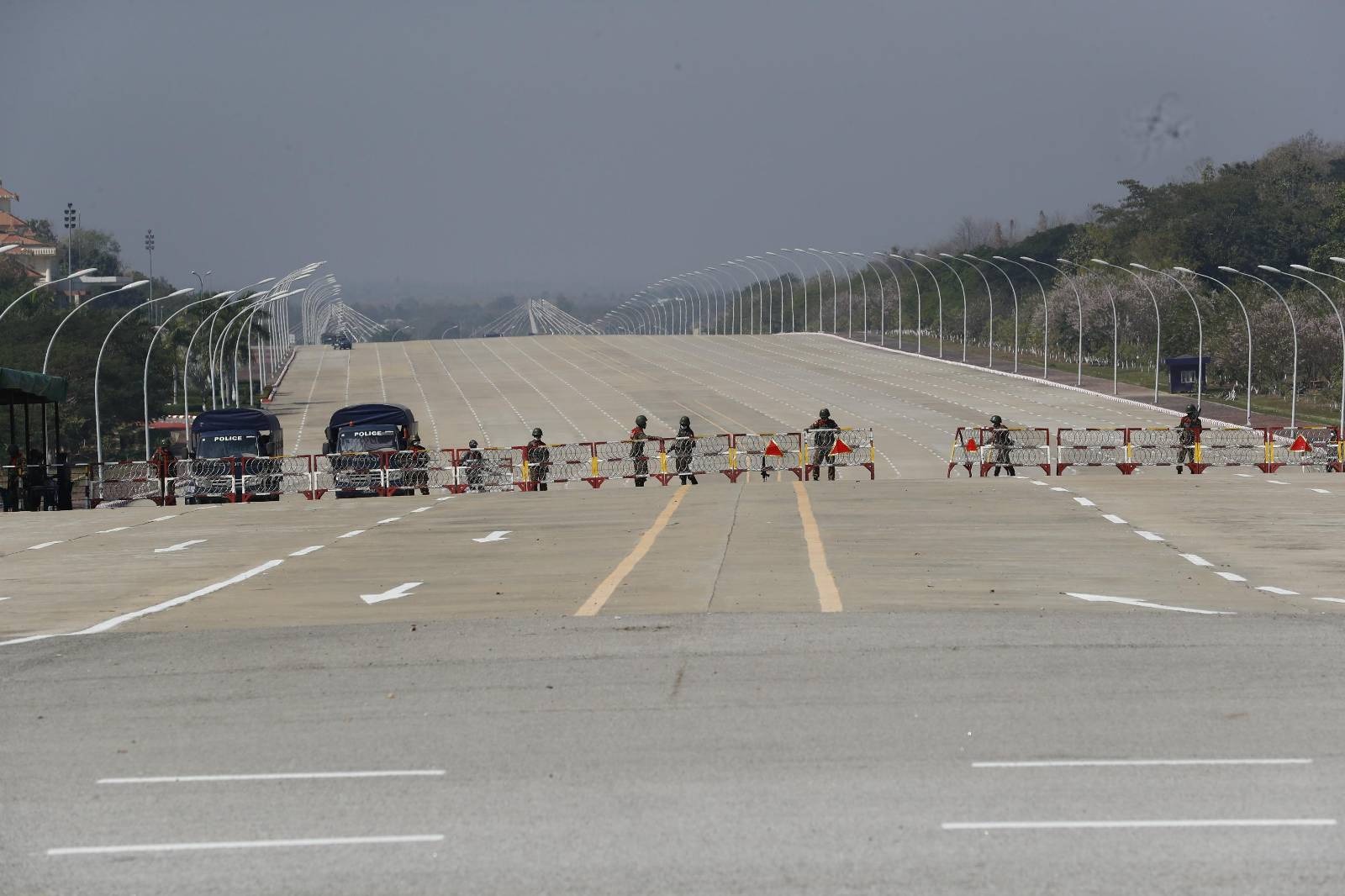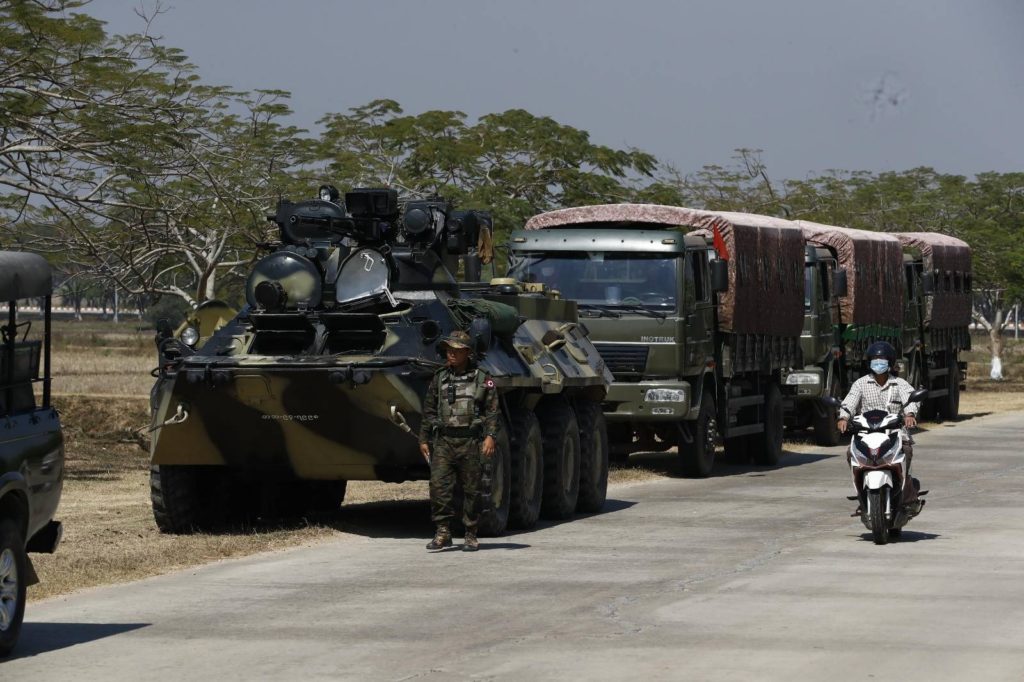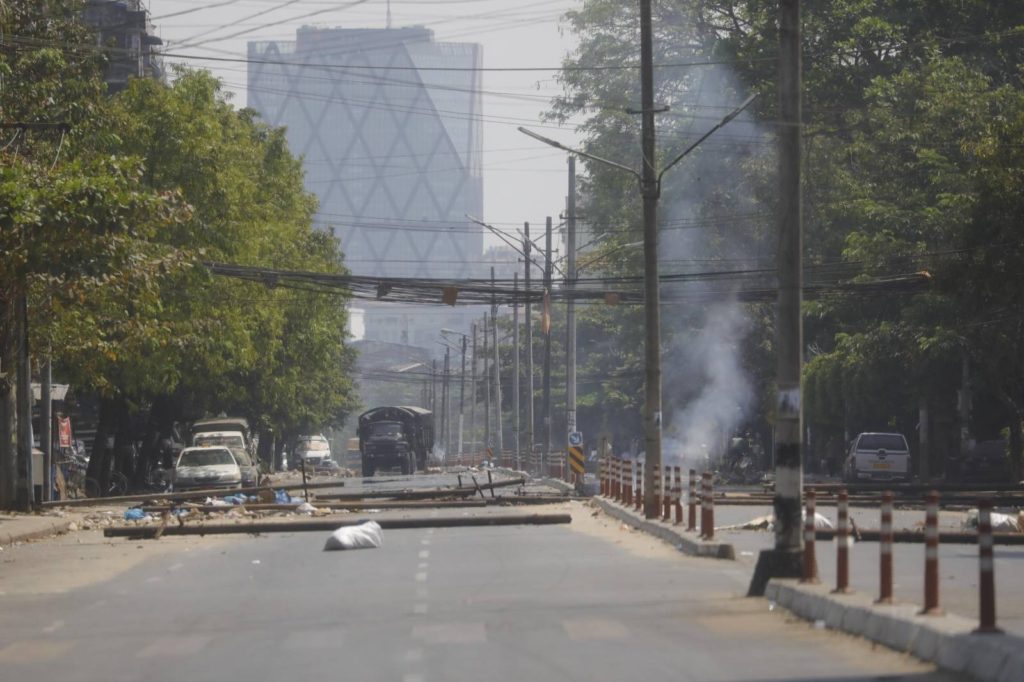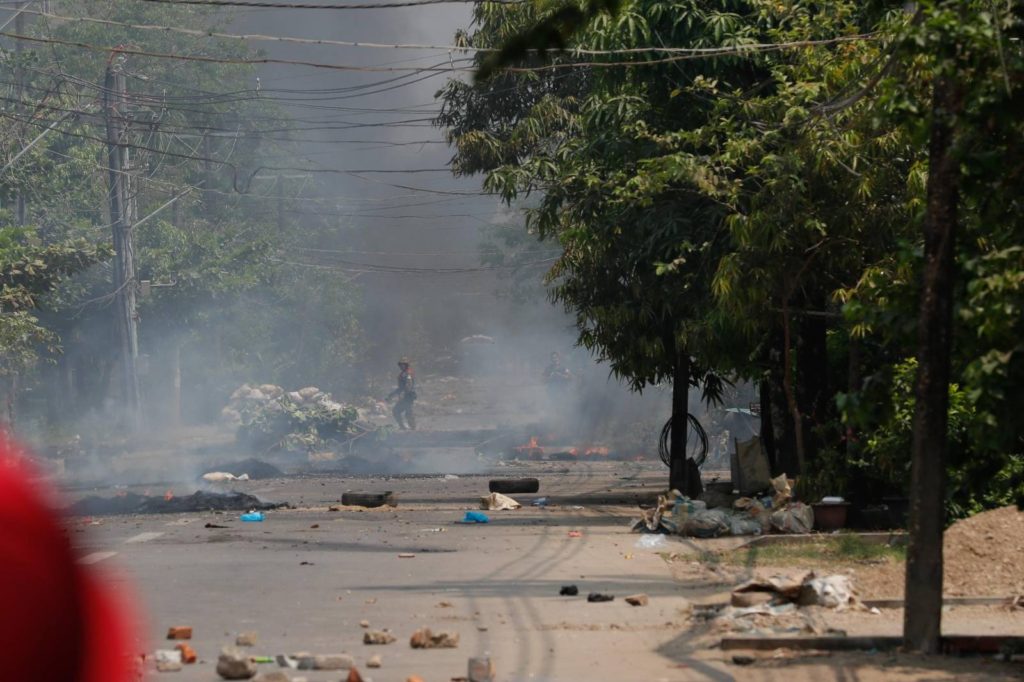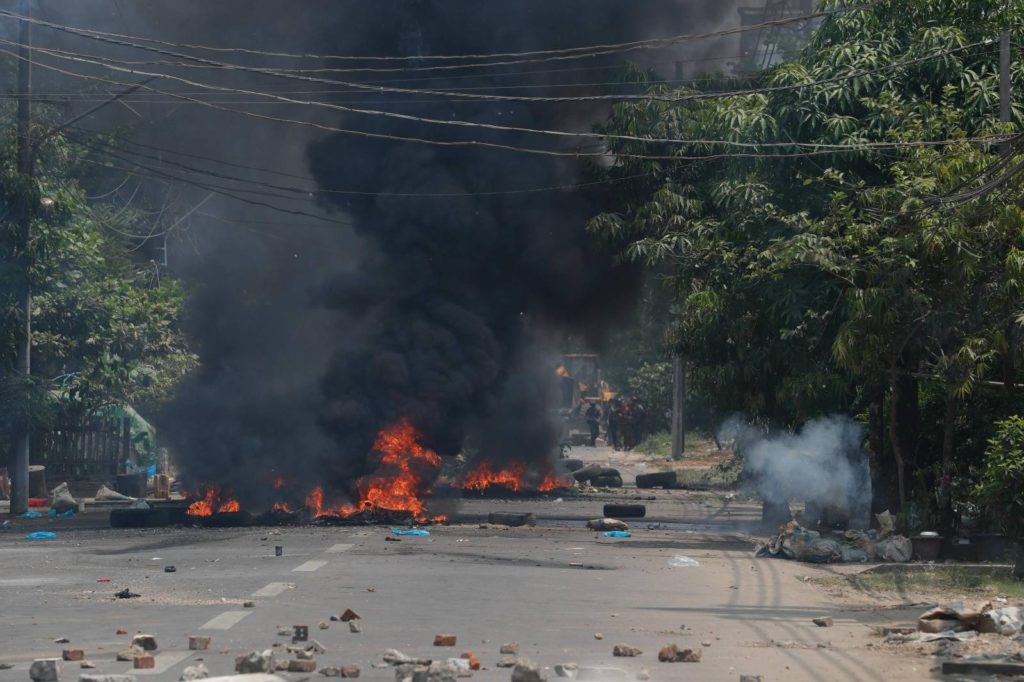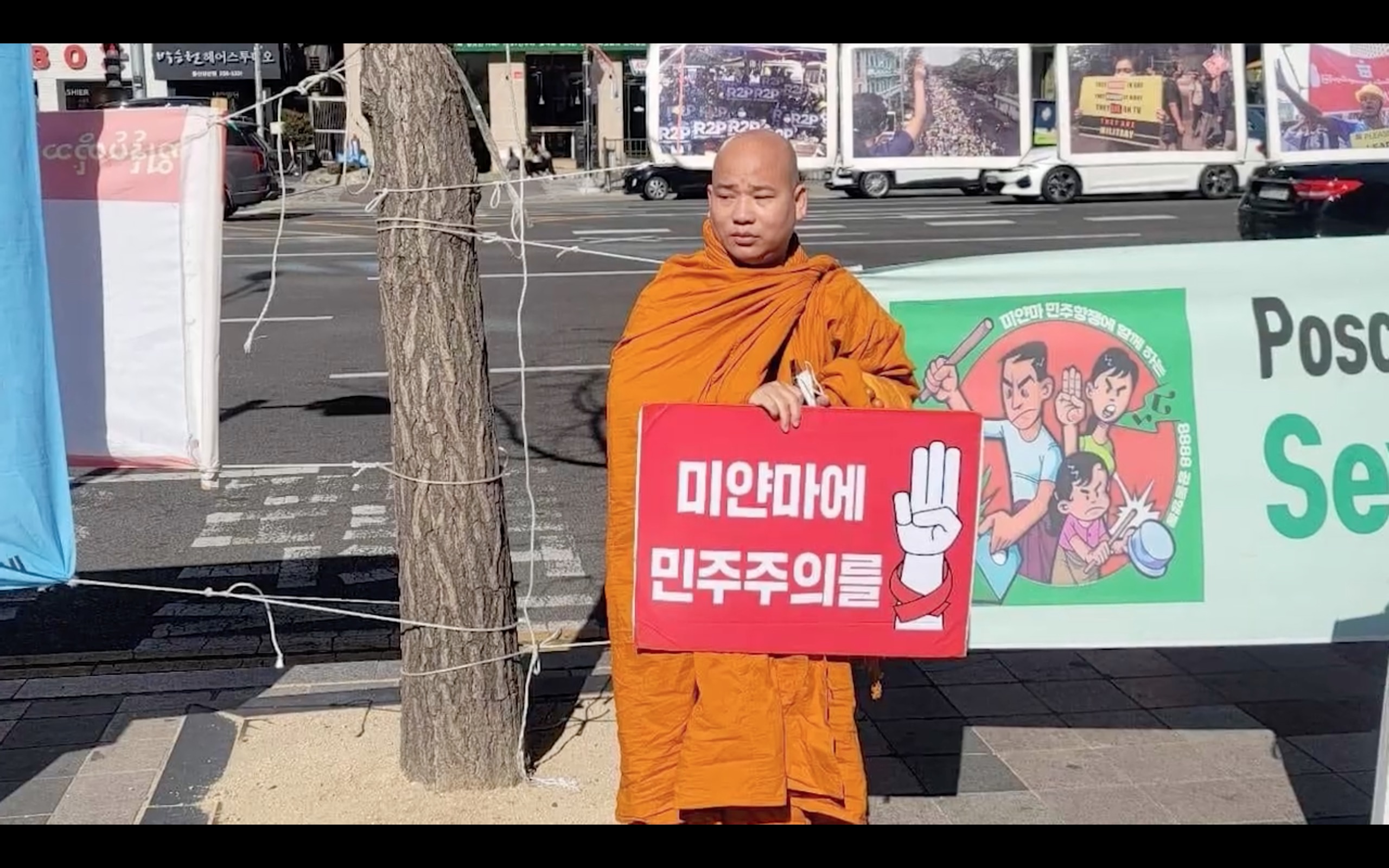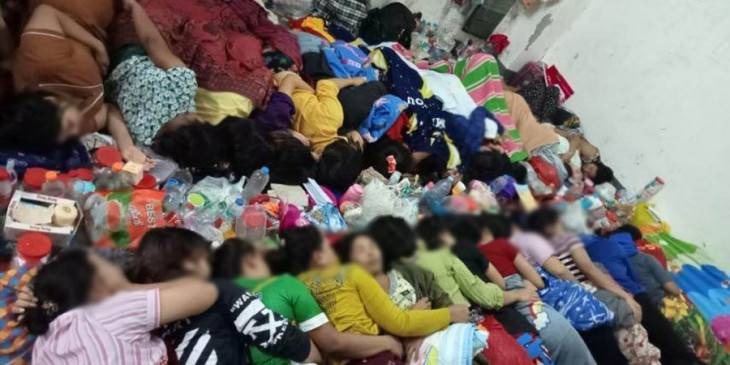Airstrikes ordered against civilian targets, destruction of thousands of buildings, millions displaced, nearly 3,000 civilians murdered, over 13,000 jailed, the country’s independent media banished, and the country locked in a deadly nationwide civil war. Myanmar civilians now ask what else must happen before they receive international support in line with Ukraine, writes Phil Thornton.
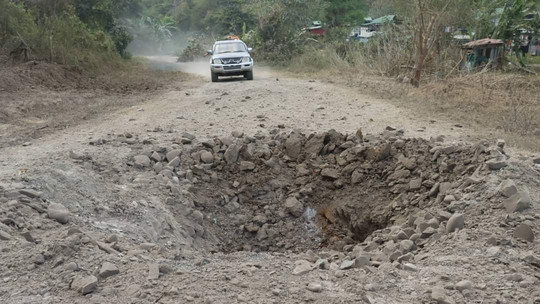
In the two years since Myanmar’s military seized power from the country’s elected lawmakers it has waged a war of terror against its citizens – members of the Civil Disobedience Movement, artists, poets, actors, politicians, health workers, student leaders, public servants, workers, and journalists.
The military-appointed State Administration Council amended laws to punish anyone critical of its illegal coup or the military. International standards of freedoms – speech, expression, assembly, and association were now ‘criminalised’. The Assistance Association for Political Prisoners (Burma), reported as of January 30, 2023, the military killed 2,901 people and arrested another 17,492 (of which 282 were children), with 13,719 people still in detention. 143 people have been sentenced to death and four have been executed since the military’s coup on February 1, 2021. Of those arrested, 176 were journalists and as many as 62 are still in jail or police detention.
The Committee to Protect Journalists ranks Myanmar as the world’s second-highest jailers of journalists. Fear of attacks, harassment, intimidation, censorship, detainment, and threats of assassination for their reporting has driven journalists and media workers underground or to try to reach safety in neighbouring countries.
Journalist Ye Htun Oo has been arrested, tortured, received death threats, and is now forced to seek safety outside of Myanmar. Ye Htun spoke to IFJ of his torture, jailing and why he felt he had no choice, but to leave Myanmar for the insecurity of a journalist in exile.
They came for me in the morning
“I started as a journalist in 2007 but quit after two years because of the difficulty of working under the military. I continued to work, writing stories and poetry. In 2009 I restarted work as a freelance video and documentary maker.”
Ye Htu said making money from journalism in Myanmar has never been easy.
“I was lucky if I made 300,000 kyat a month (around US$300) – it was a lot of work, writing, editing, interviewing and filming.”
Ye Htun’s hands, fingers and thin frame twist and turn as he takes time to return to the darkness of the early morning when woken by police and military knocking on his front door.
“It was 2 am, the morning of October 9, 2021. We were all asleep. The knocking on the door was firm but gentle. I opened the door. Men from the police and the military’s special media investigation unit stood there – no uniforms. They’d come to arrest me.”
Ye Htun links the visit of the police and army to his friend’s arrest the day before.
“He had my number on his phone and when questioned told them I was a journalist. I hadn’t written anything for a while. The only reason they arrested me was because I was identified as a journalist – it was enough for them. The military unit has a list of journalists who they want to control, arrest, jail or contain.”
Ye Htun explains how easy it is for journalists to be arrested.
“When they arrest people…if they find a reference to a journalist or a phone number it’s enough to put you on their list.”
After the coup, Ye Htun continued to report.
“I was not being paid, moving around, staying in different places, following the protests. I was taking photos. I took a photo of citizens arresting police and it was published. This causes problems for the people in the photo. It also caused some people to regard me and journalists as informers – we were now in a hard place, not knowing what or who we could photograph. I decided to stop reporting and made the decision to move home. That’s when they came and arrested me.”
In the early morning before sunrise, the police and military removed Ye Htun from his home and family and took him to a detention cell inside a military barracks.
“They took all my equipment – computer, cameras, phone, and hard disks. The men who arrested and took me to the barracks left and others took over. Their tone changed. I was accused of being a PDF (People’s Defence Force militia). Ye Htun describes how the ‘politeness’ of his captors soon evaporated, and the danger soon became a brutal reality. They started to beat me with kicks, fists, sticks and rubber batons. They just kept beating me, no questions. I was put in foot chains – ankle braces.”
The beating of Ye Htun would continue for 25 days and the uncertainty and hurt still shows in his eyes, as he drags up the details he’s now determined to share.
“I was interrogated by an army captain who ordered me to show all my articles – there was little to show. They made me kneel on small stones and beat me on the body – never the head as they said, ‘they needed it intact for me to answer their questions’”.
Ye Htun explained it wasn’t just his assigned interrogators who beat or tortured him.
“Drunk soldiers came regularly to spit, insult or threaten me with their guns or knives.”
Ye Htun is quick to acknowledge he was scared and feared for his life.
“I was terrified. No one knew where I was. I knew my family would be worried. Everyone knows of people being arrested and then their dead, broken bodies, missing vital organs, being returned to grieving families.”
After 25 days of torture, Ye Htun was transferred to a police jail.
“They accused me of sending messages they had ‘faked’ and placed on my phone. I was sentenced to two years jail on 3rd November – I had no lawyer, no representative.”
Ye Htun spoke to political prisoners during his time in jail and concluded many were behind bars on false charges.
“Most political prisoners are there because of fake accusations. There’s no proper rule of law – the military has turned the whole country into a prison.”
Ye Htun served over a year and five months of his sentence and was one of six journalists released in an amnesty from Pyay Jail on January 4, 2023.
Any respite Ye Htun or his family received from his release was short-lived, as it became apparent the military was not yet finished torturing him. He was forced to sign a declaration that if he was rearrested he would be expected to serve his existing sentence plus any new ones, and he received death threats. Soon after his release, the threats to his family were made.
“I was messaged on Facebook and on other social media apps. The messages said, ‘don’t go out alone…keep your family and wife away from us…’ their treats continued every two or three days.”
Ye Htun and his family have good cause to be concerned about the threats made against them. Several pro-military militias have openly declared on social media their intention against those opposed to the military’s control of the country. A pro-military militia, Thwe Thauk Apwe (Blood Brothers), specialise in violent killings designed to terrorise. Frontier Magazine reported in May 2022, that Thwe Thauk Apwe had murdered 14 members of the National League of Democracy political party in two weeks. The militia uses social media to boast of its gruesome killings and to threaten its targets – those opposed to military rule – PDF units, members of political parties, CDM members, independent media outlets and journalists.
Ye Htun said fears for his wife and children’s safety forced him to leave Myanmar.
“I couldn’t keep putting them at risk because I’m a journalist. I will continue to work, but I know I can’t do it in Myanmar until this military regime is removed.”
Air strikes target civilians – where’s the UN?
Award winning documentary maker and artist, Sai Kyaw Khaing, dismayed at the lack of coverage by international and regional media on the impacts of Myanmar’s military aerial strikes on civilian targets, decided to make the arduous trip to the country’s northwest to find out.
In the two years since the military regime took illegal control of the country’s political infrastructure, Myanmar is now engaged in a brutal, countrywide civil war. Civilian and political opposition to the military coup saw the formation of People Defence Force units under the banner of the National Unity Government established in April 2021 by members of parliament elected at the 2020 elections and outlawed by the military after its coup.
Thousands of young people took up arms and joined PDF units, trained by Ethnic Armed Organisations, to defend villages and civilians and fight the military regime. The regime vastly outnumbered and outmuscled the PDFs and EAOs with its military hardware – tanks, heavy artillery, helicopter gunships and fighter jets.
Sai Kyaw contacted a number of international media outlets with his plans to travel deep inside the conflict zone to document how displaced people were coping with the airstrikes and burning of their villages and crops. Sai Kyaw said it is telling that he is yet to receive a single response of interest from any of the media he approached.
“What’s happening in Myanmar is being ignored, unlike the conflict in Ukraine. Most of the international media, if they do report on Myanmar, want an ‘expert’ to front their stories, even better if it’s one of their own, a Westerner.”
Sai Kyaw explains why what is happening on the ground needs to be explained – the impacts of the deadly airstrikes on the lives of unarmed villagers.
“My objective is to talk to local people. How can they plant or harvest their crops during the intense fighting? How can they educate their kids or get medical help? Thousands of houses, schools, hospitals, churches, temples, and mosques have been targeted and destroyed – how are the people managing to live?”
Sai Kyaw put up his own money to finance his trip to a neighbouring country where he then made contact with people prepared to help him get to north western Myanmar, which was under intense attacks from the military regime.
“It took four days by motorbike on unlit mountain dirt tracks that turned to deep mud when it rained. We also had to avoid numerous military checkpoints, military informers, and spies.”
Sai Kyaw said after reaching his destination, meeting with villagers, and witnessing their response to the constant artillery and aerial bombardments, their resilience astounded him.
“These people rely on each other, when they’re bombed from their homes, people who still have a house rally around and offer shelter. They don’t have weapons to fight back, but they organise checkpoints managed by men and women.”
Sai Kyaw said being unable to predict when an airstrike will happen took its toll on villagers.
“You don’t know when they’re going to attack – day or night – clinics, schools, places of worship – are bombed. These are not military targets – they don’t care who they kill.”
Sai Kyaw witnessed an aerial bombing and has the before and after film footage that shows the destruction. Rows of neat houses, complete with walls intact before the air strike are left after the attack with holes a car could drive through.
“The unpredictable and indiscriminately attacks mean villagers are unable to harvest their crops or plant next season’s rice paddies.”
Sai Kyaw is concerned that the lack of aid getting to the people in need of shelter, clothing, food, and medicine will cause a large-scale humanitarian crisis.
“There’s no sign of international aid getting to the people. If there’s a genuine desire to help the people, international aid groups can do it by making contact with local community groups. It seems some of these big international aid donors are reluctant to move from their city bases in case they upset the military’s SAC [State Administration Council].”
At the time of writing Sai Kyaw Khaing is still to receive a reply from any of the international media he contacted.
It’s the economy stupid
A veteran Myanmar journalist, Kyaw Kyaw*, covered a wide range of stories for more than 15 years, including business, investment, and trade. He told IFJ he is concerned the ban on independent media, arrests of journalists, gags and access restrictions on sources mean many important stories go unreported.
“The military banning of independent media is a serious threat to our freedom of speech. The military-controlled state media can’t be relied on. It’s well documented, it’s mainly no news or fake news overseen by the military’s department of propaganda.”
Kyaw lists the stories that he explains are in critical need of being reported – the cost of consumer goods, the collapse of the local currency, impact on wages, lack of education and health care, brain drain as people flee the country, crops destroyed and unharvested and impact on next year’s yield. Kyaw is quick to add details to his list.
“People can’t leave the country fast enough. There are more sellers than buyers of cars and houses. Crime is on the rise as workers’ real wages fall below the poverty line. Garment workers earned 4,800 kyat, the minimum daily rate before the military’s coup. The kyat was around 1,200 to the US dollar – about four dollars. Two years after the coup the kyat is around 2,800 – workers’ daily wage has dropped to half, about US$2 a day.”
Kyaw Kyaw’s critique is compelling as he explains the cost of everyday consumer goods and the impact on households.
“Before the coup in 2021, rice cost a household, 32,000 kyat for around 45kg. It is now selling at 65,000 kyat and rising. Cooking oil sold at 3,000 kyat for 1.6kg now sells for over double, 8,000kyat. It’s the same with fish, chicken, fuel, and medicine – family planning implants have almost doubled in cost from 25,000 kyat to now selling at 45,000 kyat.”
Kyaw is dismayed that the media outside the country are not covering stories that have a huge impact on people’s daily struggle to feed and care for their families and have the real potential for a massive humanitarian crisis in the near future.
“The focus is on the revolution, tallies of dead soldiers, politics – all important, but journalists and local and international media need to report on the hidden costs of the military’s coup. Local media outlets need to find solutions to better cover these issues.”
Kyaw stresses international governments and institutions – ASEAN, UK, US, China, and India – need to stop talking and take real steps to remove and curb the military’s destruction of the country.
“In two years, they displaced over a million people, destroyed thousands of houses and religious buildings, attacked schools and hospitals – killing students and civilians – what is the UNSC waiting for?”
An independent think tank, the Institute for Strategy and Policy – Myanmar, and the UN agency for refugees confirm Kyaws Kyaw’s claims.The Institute for Strategy and Policy reports “at least 28,419 homes and buildings were torched or destroyed…in the aftermath of the coup between February 1, 2021, and July 15, 2022.”
The UN agency responsible for refugees, the UNHCR, estimates the number of displaced people in Myanmar is a staggering 1,574,400. Since the military coup and up to 23 January 23, the number is 1,244,000 people displaced.
While the world’s media and governments focus their attention and military aid on Ukraine, Myanmar’s people continue to ask why their plight continues to be ignored.
Phil Thornton is a journalist and senior adviser to the International Federation of Journalists in South East Asia.
*Name has been changed as requested for security concerns.



